Assignment on Firm’s Marginal Production
VerifiedAdded on 2022/09/28
|8
|712
|20
Assignment
AI Summary
Contribute Materials
Your contribution can guide someone’s learning journey. Share your
documents today.
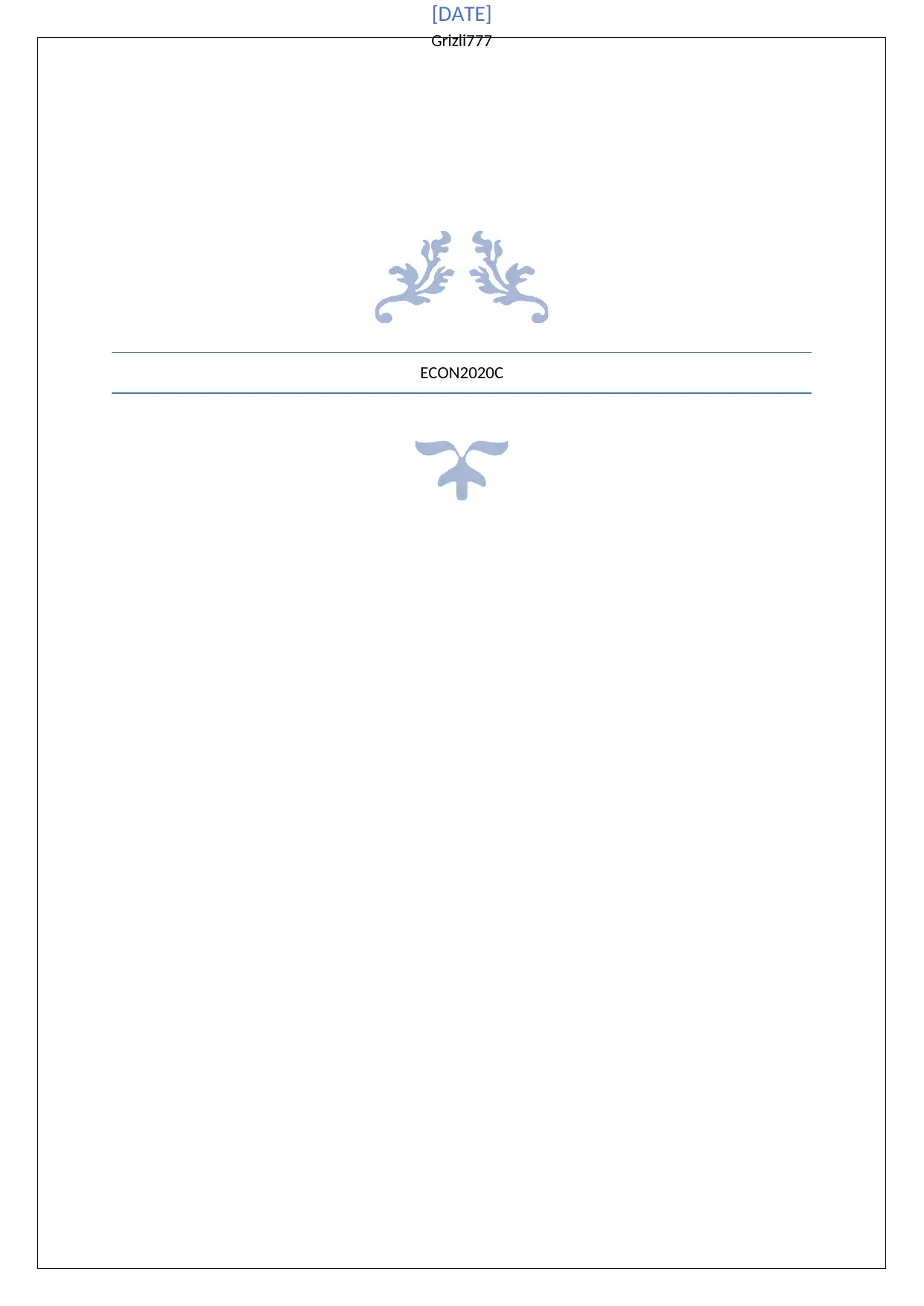
ECON2020C
[DATE]
Grizli777
[DATE]
Grizli777
Secure Best Marks with AI Grader
Need help grading? Try our AI Grader for instant feedback on your assignments.
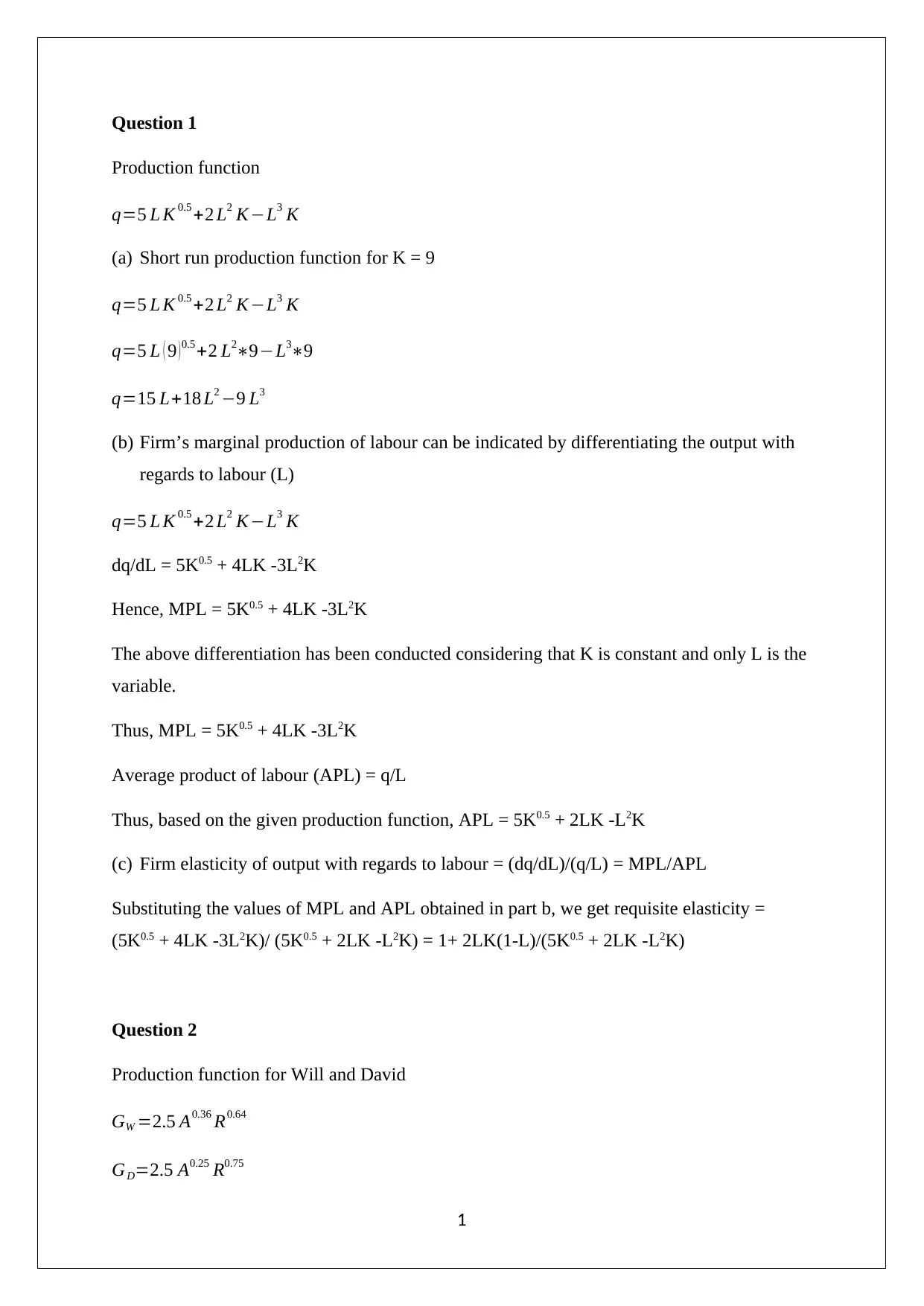
Question 1
Production function
q=5 L K 0.5 +2 L2 K−L3 K
(a) Short run production function for K = 9
q=5 L K 0.5 +2 L2 K−L3 K
q=5 L ( 9 ) 0.5 +2 L2∗9−L3∗9
q=15 L+18 L2 −9 L3
(b) Firm’s marginal production of labour can be indicated by differentiating the output with
regards to labour (L)
q=5 L K 0.5 +2 L2 K−L3 K
dq/dL = 5K0.5 + 4LK -3L2K
Hence, MPL = 5K0.5 + 4LK -3L2K
The above differentiation has been conducted considering that K is constant and only L is the
variable.
Thus, MPL = 5K0.5 + 4LK -3L2K
Average product of labour (APL) = q/L
Thus, based on the given production function, APL = 5K0.5 + 2LK -L2K
(c) Firm elasticity of output with regards to labour = (dq/dL)/(q/L) = MPL/APL
Substituting the values of MPL and APL obtained in part b, we get requisite elasticity =
(5K0.5 + 4LK -3L2K)/ (5K0.5 + 2LK -L2K) = 1+ 2LK(1-L)/(5K0.5 + 2LK -L2K)
Question 2
Production function for Will and David
GW =2.5 A0.36 R0.64
GD=2.5 A0.25 R0.75
1
Production function
q=5 L K 0.5 +2 L2 K−L3 K
(a) Short run production function for K = 9
q=5 L K 0.5 +2 L2 K−L3 K
q=5 L ( 9 ) 0.5 +2 L2∗9−L3∗9
q=15 L+18 L2 −9 L3
(b) Firm’s marginal production of labour can be indicated by differentiating the output with
regards to labour (L)
q=5 L K 0.5 +2 L2 K−L3 K
dq/dL = 5K0.5 + 4LK -3L2K
Hence, MPL = 5K0.5 + 4LK -3L2K
The above differentiation has been conducted considering that K is constant and only L is the
variable.
Thus, MPL = 5K0.5 + 4LK -3L2K
Average product of labour (APL) = q/L
Thus, based on the given production function, APL = 5K0.5 + 2LK -L2K
(c) Firm elasticity of output with regards to labour = (dq/dL)/(q/L) = MPL/APL
Substituting the values of MPL and APL obtained in part b, we get requisite elasticity =
(5K0.5 + 4LK -3L2K)/ (5K0.5 + 2LK -L2K) = 1+ 2LK(1-L)/(5K0.5 + 2LK -L2K)
Question 2
Production function for Will and David
GW =2.5 A0.36 R0.64
GD=2.5 A0.25 R0.75
1
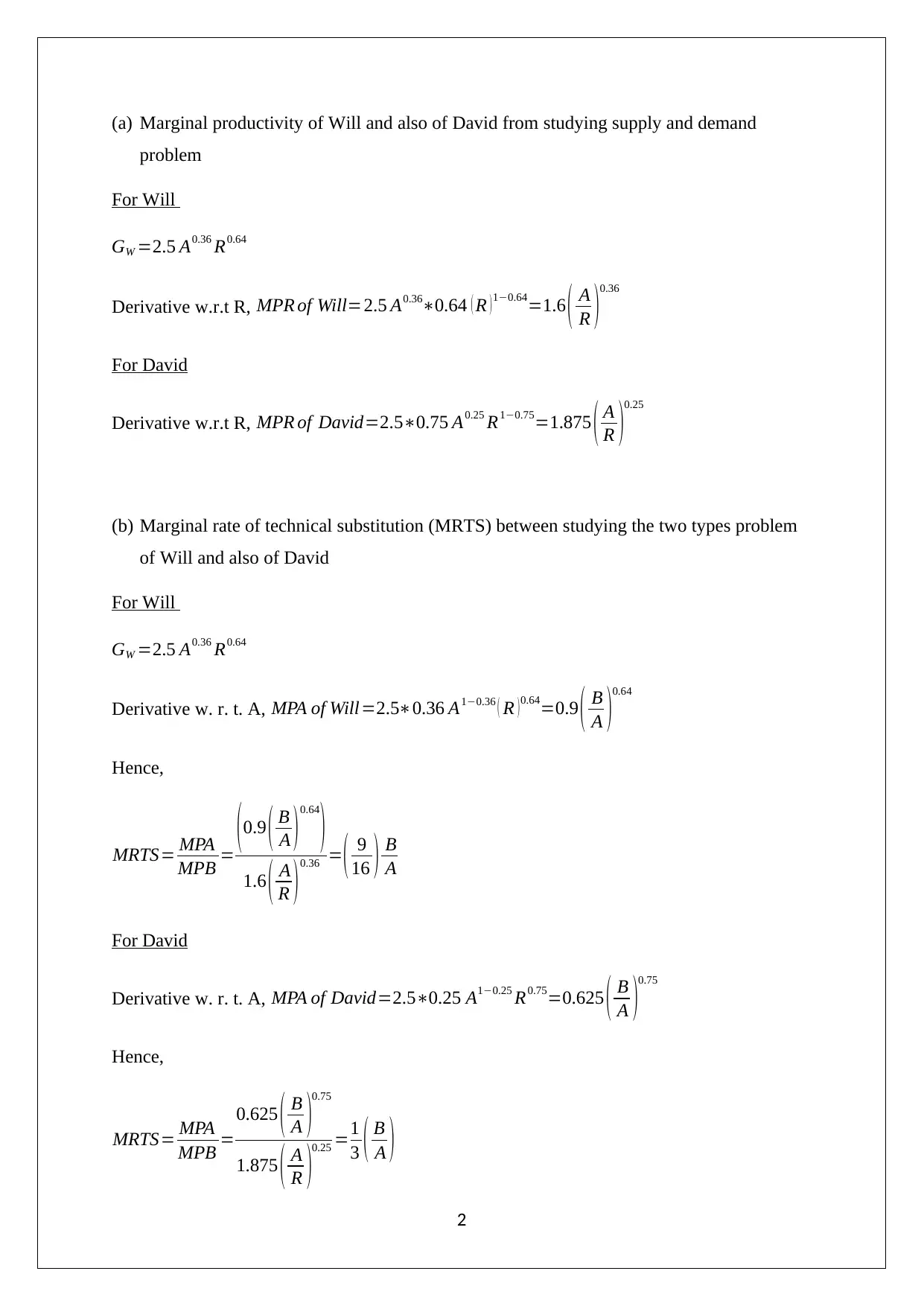
(a) Marginal productivity of Will and also of David from studying supply and demand
problem
For Will
GW =2.5 A0.36 R0.64
Derivative w.r.t R, MPR of Will=2.5 A0.36∗0.64 ( R )1−0.64=1.6 ( A
R )0.36
For David
Derivative w.r.t R, MPR of David=2.5∗0.75 A0.25 R1−0.75=1.875 ( A
R )
0.25
(b) Marginal rate of technical substitution (MRTS) between studying the two types problem
of Will and also of David
For Will
GW =2.5 A0.36 R0.64
Derivative w. r. t. A, MPA of Will=2.5∗0.36 A1−0.36 ( R ) 0.64=0.9 ( B
A )
0.64
Hence,
MRTS= MPA
MPB =
(0.9 ( B
A )0.64
)
1.6 ( A
R )0.36 = ( 9
16 ) B
A
For David
Derivative w. r. t. A, MPA of David=2.5∗0.25 A1−0.25 R0.75=0.625 ( B
A )
0.75
Hence,
MRTS= MPA
MPB =
0.625 ( B
A )
0.75
1.875 ( A
R )
0.25 =1
3 ( B
A )
2
problem
For Will
GW =2.5 A0.36 R0.64
Derivative w.r.t R, MPR of Will=2.5 A0.36∗0.64 ( R )1−0.64=1.6 ( A
R )0.36
For David
Derivative w.r.t R, MPR of David=2.5∗0.75 A0.25 R1−0.75=1.875 ( A
R )
0.25
(b) Marginal rate of technical substitution (MRTS) between studying the two types problem
of Will and also of David
For Will
GW =2.5 A0.36 R0.64
Derivative w. r. t. A, MPA of Will=2.5∗0.36 A1−0.36 ( R ) 0.64=0.9 ( B
A )
0.64
Hence,
MRTS= MPA
MPB =
(0.9 ( B
A )0.64
)
1.6 ( A
R )0.36 = ( 9
16 ) B
A
For David
Derivative w. r. t. A, MPA of David=2.5∗0.25 A1−0.25 R0.75=0.625 ( B
A )
0.75
Hence,
MRTS= MPA
MPB =
0.625 ( B
A )
0.75
1.875 ( A
R )
0.25 =1
3 ( B
A )
2
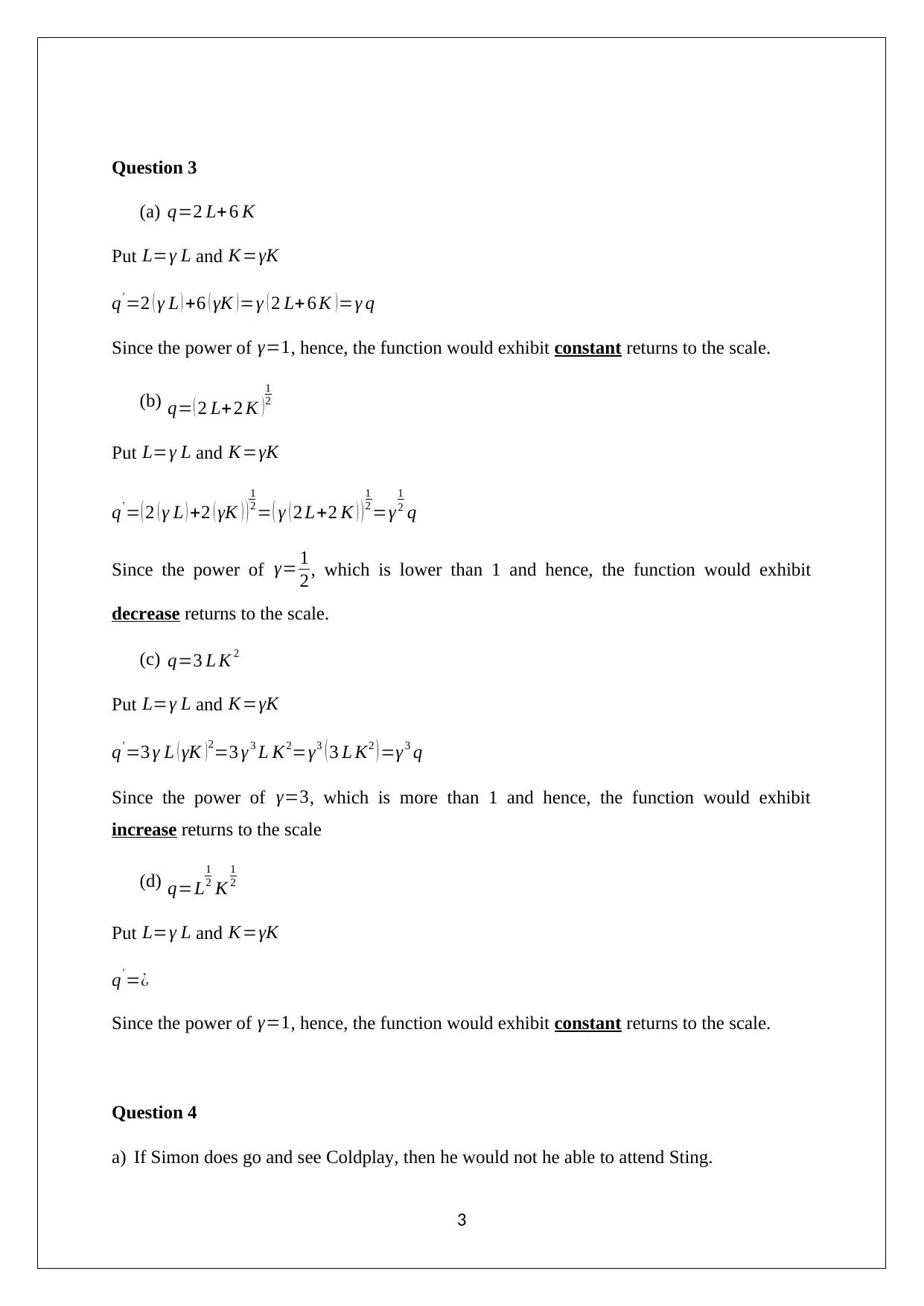
Question 3
(a) q=2 L+ 6 K
Put L=γ L and K=γK
q' =2 ( γ L ) +6 ( γK )=γ ( 2 L+6 K )=γ q
Since the power of γ=1, hence, the function would exhibit constant returns to the scale.
(b) q= ( 2 L+2 K )
1
2
Put L=γ L and K=γK
q' = ( 2 ( γ L ) +2 ( γK ) )
1
2 = ( γ ( 2 L+2 K ) )
1
2 =γ
1
2 q
Since the power of γ= 1
2 , which is lower than 1 and hence, the function would exhibit
decrease returns to the scale.
(c) q=3 L K 2
Put L=γ L and K=γK
q' =3 γ L ( γK )2=3 γ 3 L K2=γ3 ( 3 L K2 ) =γ 3 q
Since the power of γ=3, which is more than 1 and hence, the function would exhibit
increase returns to the scale
(d) q=L
1
2 K
1
2
Put L=γ L and K=γK
q' =¿
Since the power of γ=1, hence, the function would exhibit constant returns to the scale.
Question 4
a) If Simon does go and see Coldplay, then he would not he able to attend Sting.
3
(a) q=2 L+ 6 K
Put L=γ L and K=γK
q' =2 ( γ L ) +6 ( γK )=γ ( 2 L+6 K )=γ q
Since the power of γ=1, hence, the function would exhibit constant returns to the scale.
(b) q= ( 2 L+2 K )
1
2
Put L=γ L and K=γK
q' = ( 2 ( γ L ) +2 ( γK ) )
1
2 = ( γ ( 2 L+2 K ) )
1
2 =γ
1
2 q
Since the power of γ= 1
2 , which is lower than 1 and hence, the function would exhibit
decrease returns to the scale.
(c) q=3 L K 2
Put L=γ L and K=γK
q' =3 γ L ( γK )2=3 γ 3 L K2=γ3 ( 3 L K2 ) =γ 3 q
Since the power of γ=3, which is more than 1 and hence, the function would exhibit
increase returns to the scale
(d) q=L
1
2 K
1
2
Put L=γ L and K=γK
q' =¿
Since the power of γ=1, hence, the function would exhibit constant returns to the scale.
Question 4
a) If Simon does go and see Coldplay, then he would not he able to attend Sting.
3
Secure Best Marks with AI Grader
Need help grading? Try our AI Grader for instant feedback on your assignments.
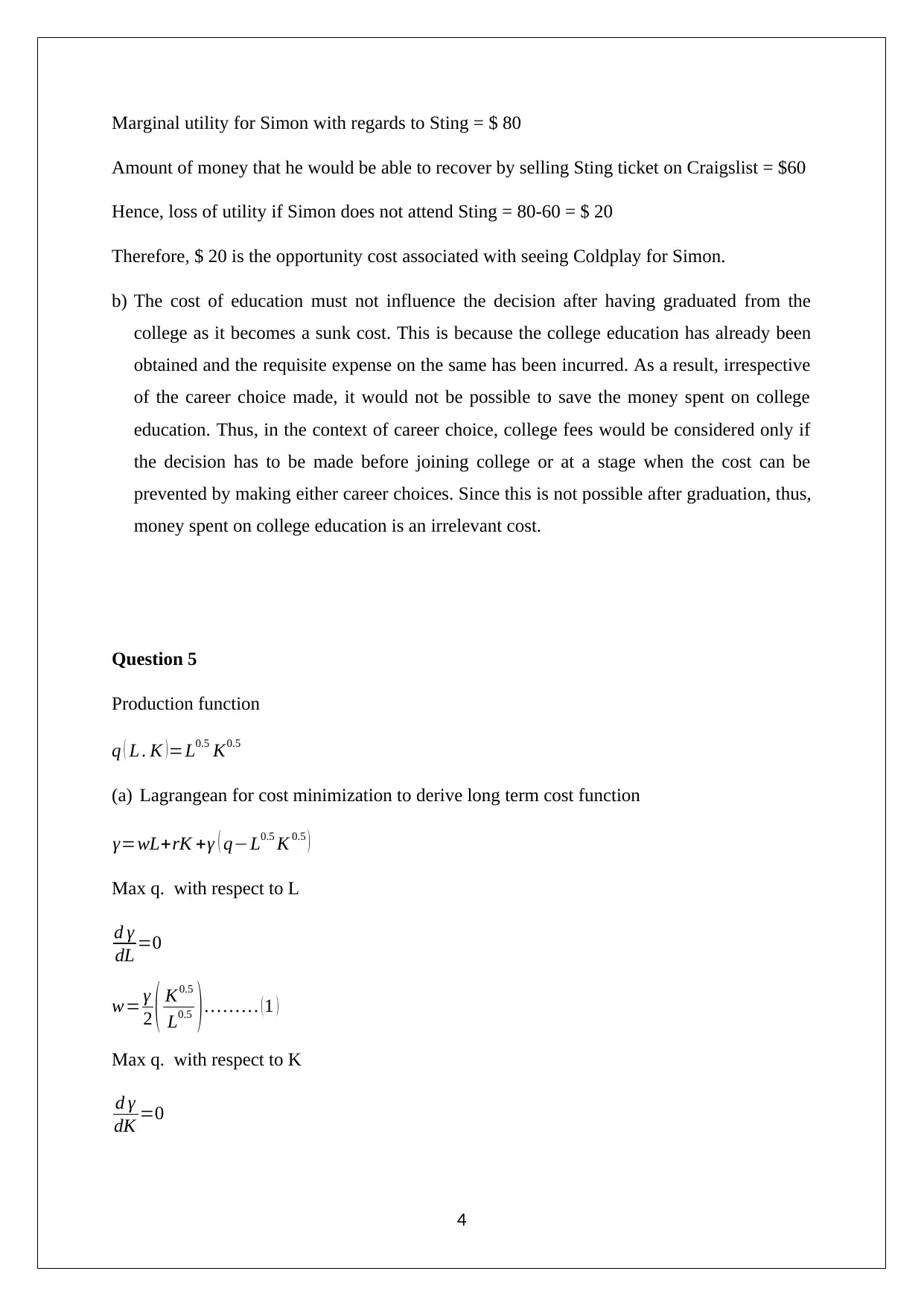
Marginal utility for Simon with regards to Sting = $ 80
Amount of money that he would be able to recover by selling Sting ticket on Craigslist = $60
Hence, loss of utility if Simon does not attend Sting = 80-60 = $ 20
Therefore, $ 20 is the opportunity cost associated with seeing Coldplay for Simon.
b) The cost of education must not influence the decision after having graduated from the
college as it becomes a sunk cost. This is because the college education has already been
obtained and the requisite expense on the same has been incurred. As a result, irrespective
of the career choice made, it would not be possible to save the money spent on college
education. Thus, in the context of career choice, college fees would be considered only if
the decision has to be made before joining college or at a stage when the cost can be
prevented by making either career choices. Since this is not possible after graduation, thus,
money spent on college education is an irrelevant cost.
Question 5
Production function
q ( L . K )=L0.5 K0.5
(a) Lagrangean for cost minimization to derive long term cost function
γ=wL+rK +γ ( q−L0.5 K 0.5 )
Max q. with respect to L
d γ
dL =0
w= γ
2 ( K0.5
L0.5 ) … … … ( 1 )
Max q. with respect to K
d γ
dK =0
4
Amount of money that he would be able to recover by selling Sting ticket on Craigslist = $60
Hence, loss of utility if Simon does not attend Sting = 80-60 = $ 20
Therefore, $ 20 is the opportunity cost associated with seeing Coldplay for Simon.
b) The cost of education must not influence the decision after having graduated from the
college as it becomes a sunk cost. This is because the college education has already been
obtained and the requisite expense on the same has been incurred. As a result, irrespective
of the career choice made, it would not be possible to save the money spent on college
education. Thus, in the context of career choice, college fees would be considered only if
the decision has to be made before joining college or at a stage when the cost can be
prevented by making either career choices. Since this is not possible after graduation, thus,
money spent on college education is an irrelevant cost.
Question 5
Production function
q ( L . K )=L0.5 K0.5
(a) Lagrangean for cost minimization to derive long term cost function
γ=wL+rK +γ ( q−L0.5 K 0.5 )
Max q. with respect to L
d γ
dL =0
w= γ
2 ( K0.5
L0.5 ) … … … ( 1 )
Max q. with respect to K
d γ
dK =0
4
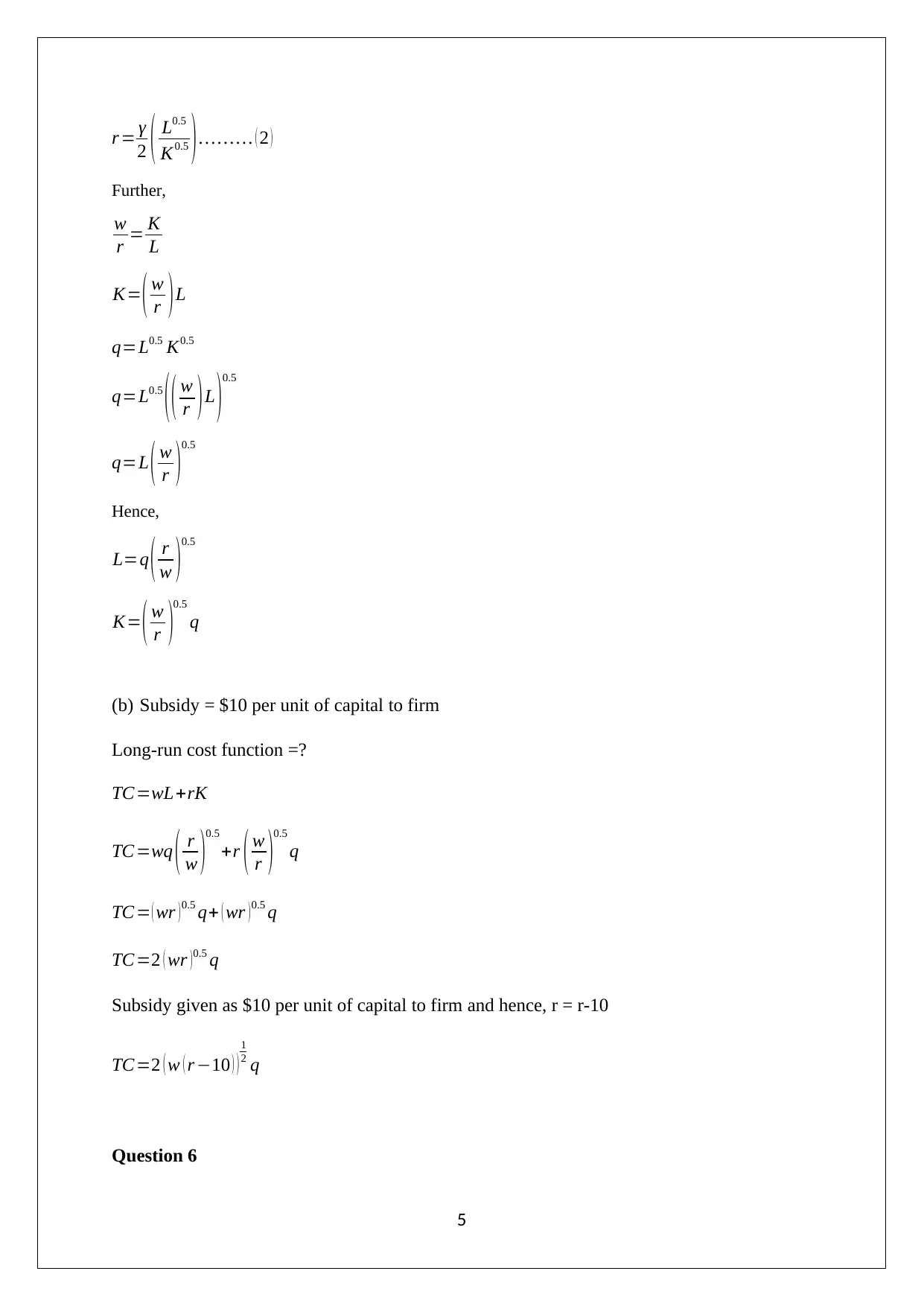
r = γ
2 ( L0.5
K0.5 ) … … … ( 2 )
Further,
w
r = K
L
K= ( w
r )L
q=L0.5 K0.5
q=L0.5
( ( w
r ) L )
0.5
q=L ( w
r )0.5
Hence,
L=q ( r
w )
0.5
K= ( w
r )
0.5
q
(b) Subsidy = $10 per unit of capital to firm
Long-run cost function =?
TC=wL+rK
TC =wq ( r
w )
0.5
+r ( w
r )
0.5
q
TC= ( wr )0.5 q+ ( wr )0.5 q
TC=2 ( wr ) 0.5 q
Subsidy given as $10 per unit of capital to firm and hence, r = r-10
TC =2 ( w ( r −10 ) )
1
2 q
Question 6
5
2 ( L0.5
K0.5 ) … … … ( 2 )
Further,
w
r = K
L
K= ( w
r )L
q=L0.5 K0.5
q=L0.5
( ( w
r ) L )
0.5
q=L ( w
r )0.5
Hence,
L=q ( r
w )
0.5
K= ( w
r )
0.5
q
(b) Subsidy = $10 per unit of capital to firm
Long-run cost function =?
TC=wL+rK
TC =wq ( r
w )
0.5
+r ( w
r )
0.5
q
TC= ( wr )0.5 q+ ( wr )0.5 q
TC=2 ( wr ) 0.5 q
Subsidy given as $10 per unit of capital to firm and hence, r = r-10
TC =2 ( w ( r −10 ) )
1
2 q
Question 6
5
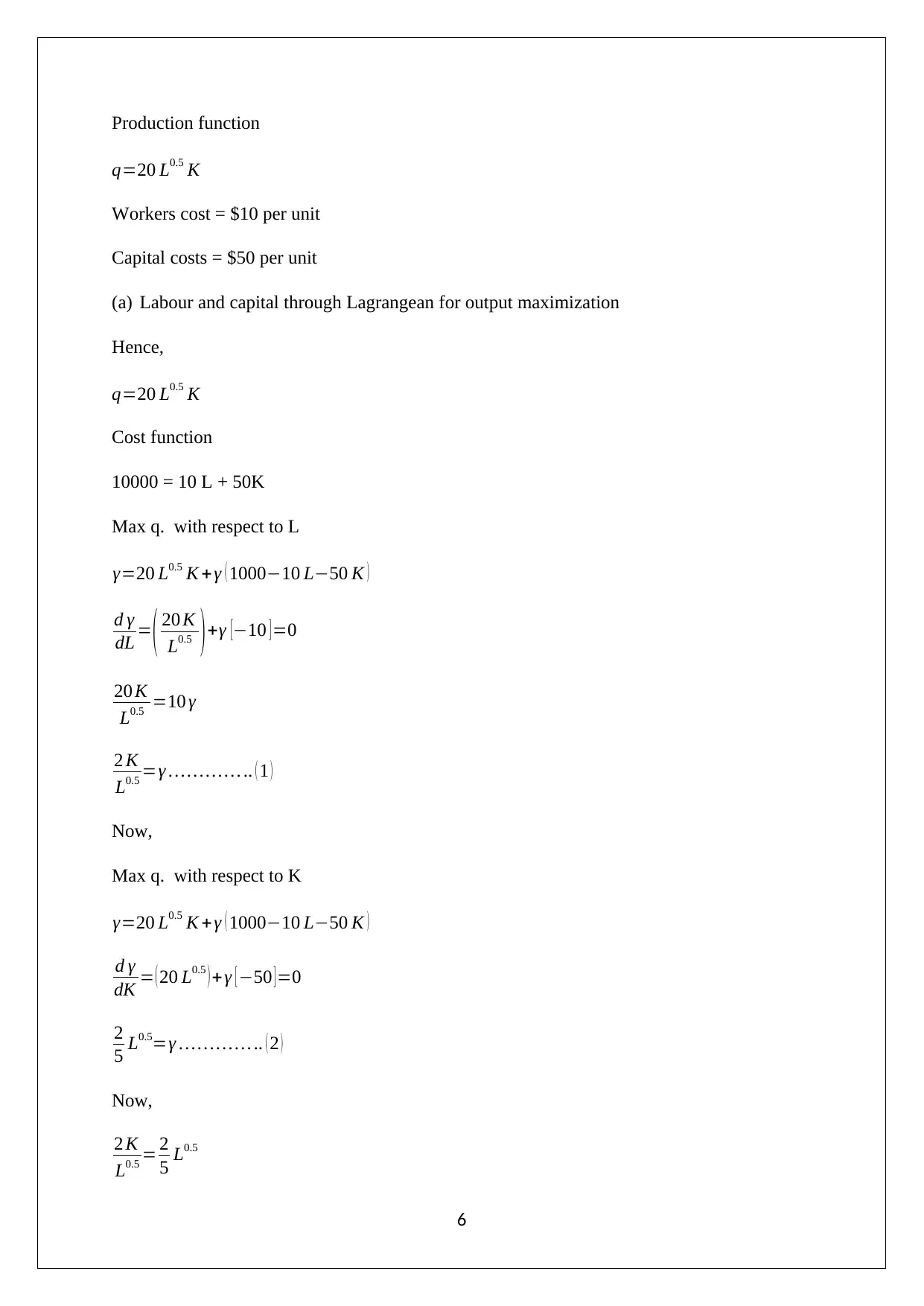
Production function
q=20 L0.5 K
Workers cost = $10 per unit
Capital costs = $50 per unit
(a) Labour and capital through Lagrangean for output maximization
Hence,
q=20 L0.5 K
Cost function
10000 = 10 L + 50K
Max q. with respect to L
γ=20 L0.5 K +γ ( 1000−10 L−50 K )
d γ
dL = ( 20 K
L0.5 ) +γ [−10 ] =0
20 K
L0.5 =10 γ
2 K
L0.5 =γ … … … … .. ( 1 )
Now,
Max q. with respect to K
γ=20 L0.5 K +γ ( 1000−10 L−50 K )
d γ
dK = ( 20 L0.5 ) + γ [ −50 ]=0
2
5 L0.5=γ … … … … .. ( 2 )
Now,
2 K
L0.5 = 2
5 L0.5
6
q=20 L0.5 K
Workers cost = $10 per unit
Capital costs = $50 per unit
(a) Labour and capital through Lagrangean for output maximization
Hence,
q=20 L0.5 K
Cost function
10000 = 10 L + 50K
Max q. with respect to L
γ=20 L0.5 K +γ ( 1000−10 L−50 K )
d γ
dL = ( 20 K
L0.5 ) +γ [−10 ] =0
20 K
L0.5 =10 γ
2 K
L0.5 =γ … … … … .. ( 1 )
Now,
Max q. with respect to K
γ=20 L0.5 K +γ ( 1000−10 L−50 K )
d γ
dK = ( 20 L0.5 ) + γ [ −50 ]=0
2
5 L0.5=γ … … … … .. ( 2 )
Now,
2 K
L0.5 = 2
5 L0.5
6
Paraphrase This Document
Need a fresh take? Get an instant paraphrase of this document with our AI Paraphraser
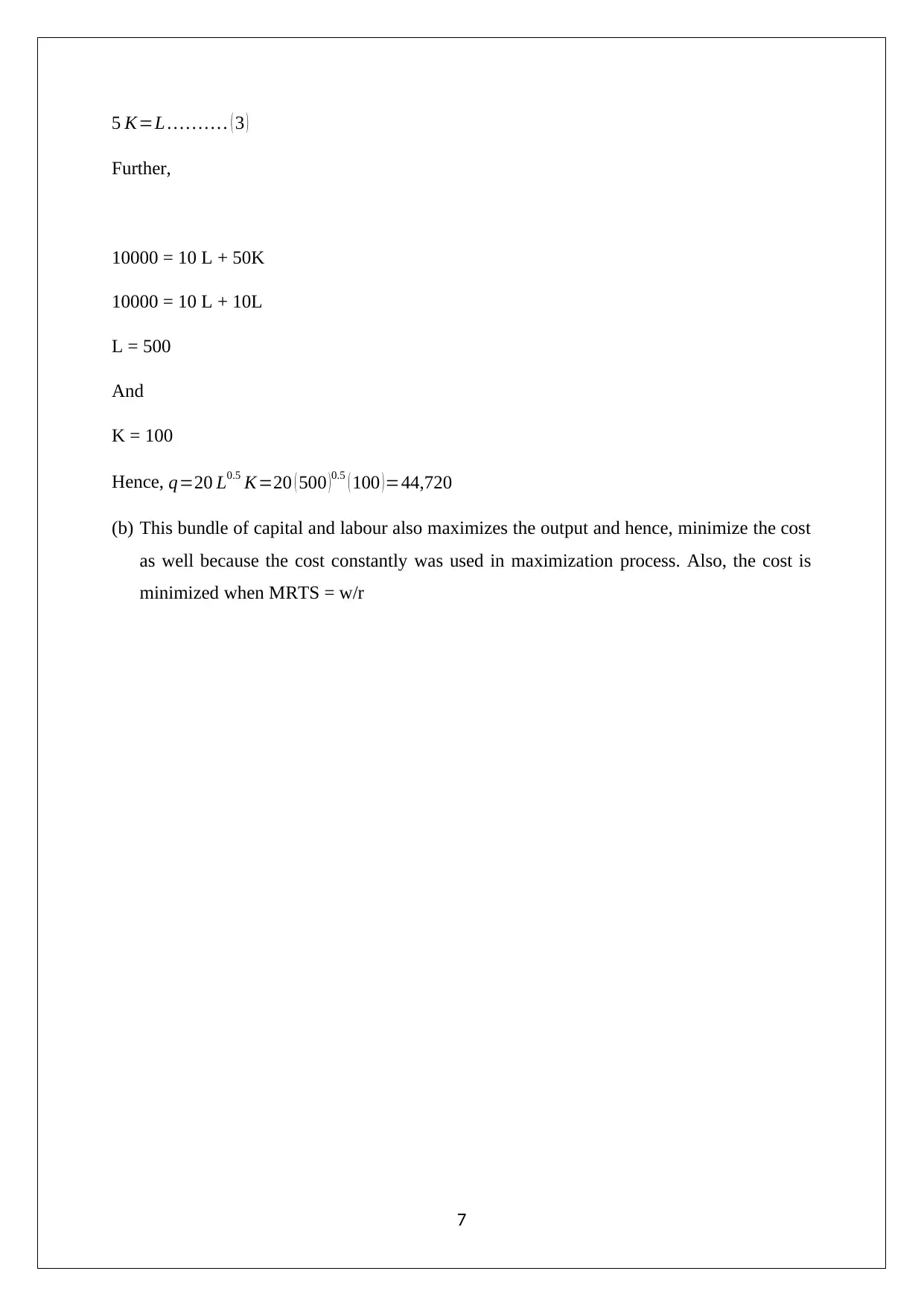
5 K=L … … … . ( 3 )
Further,
10000 = 10 L + 50K
10000 = 10 L + 10L
L = 500
And
K = 100
Hence, q=20 L0.5 K=20 ( 500 ) 0.5 ( 100 ) =44,720
(b) This bundle of capital and labour also maximizes the output and hence, minimize the cost
as well because the cost constantly was used in maximization process. Also, the cost is
minimized when MRTS = w/r
7
Further,
10000 = 10 L + 50K
10000 = 10 L + 10L
L = 500
And
K = 100
Hence, q=20 L0.5 K=20 ( 500 ) 0.5 ( 100 ) =44,720
(b) This bundle of capital and labour also maximizes the output and hence, minimize the cost
as well because the cost constantly was used in maximization process. Also, the cost is
minimized when MRTS = w/r
7
1 out of 8
Your All-in-One AI-Powered Toolkit for Academic Success.
+13062052269
info@desklib.com
Available 24*7 on WhatsApp / Email
![[object Object]](/_next/static/media/star-bottom.7253800d.svg)
Unlock your academic potential
© 2024 | Zucol Services PVT LTD | All rights reserved.

